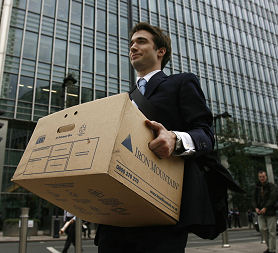Lehman Brothers collapse, Britain’s near miss
The collapse of Lehman Brothers in 2008 triggered financial turmoil around the world. Economics Editor Faisal Islam reveals the inside story of how close Britain came to a costly bailout.
On 15 September 2008 Lehman Brothers, one of America’s largest investment banks, filed for bankruptcy – a move that would send shock waves throughout world markets as US authorities scrambled to save the bank.
On the day, the immediate aftermath of the decision was striking. Outside the bank one Lehman Brothers worker said: “It’s a nightmare. Death. It’s like a massive earthquake.”
Another said: “It’s filed for bankruptcy so everybody is gone”.
Receivers immediately warned the collapse would leave hundreds of billions of dollars in liabilities. Across the world, markets tumbled.
On the day, in London an estimated £50bn was wiped from the value of leading shares. The FTSE 100 index dropped almost 4 per cent, finishing over 200 points down.
Germany’s DAX index fell by more than 2.5 per cent, the Dow Jones in New York was down by more than 2 per cent.
The banking sector was instantly hit by the news. HBOS shares finished the day down 17 per cent. Royal Bank of Scotland shares fell 12 per cent.
New York’s governor warned that as many as 30,000 Wall Street jobs could be lost.
This is, said one analyst, one of the most brutal days on record. It was now up to the authorities to battle to prevent financial instability from spreading further.
With confidence already fragile, the US now had three of its biggest finance houses felled by the crisis, from jobs to pension funds, the impact was inescapable.
<!–
–> <!–
–>

Did Britain dodge the bullet?
So the question is did Alistair Darling contribute to what was the world’s most calamitous banking bankruptcy since the Great Depression or did his actions help Britain dodge a bullet? A toxic waste dump.
Larry McDonald, author of Colossal failure of Common Sense told Channel 4 News: “If Barclays had bought Lehman Brothers, the unwind or the impact on the global economy, the impact on job losses, would have been much more…controlled – a controlled unwind of bad assets that Lehman had. But they didn’t do it and by letting her go, Lehman Brothers literally, obliterated the world economy.”
David Wessel, author of In Fed we trust, told Channel 4 News: “It seems like Barclays may have had some indigestion there. It wasn’t like there weren’t enough problems in the British banking system without taking on a big US bank that was in pretty bad shape.
“In retrospect it seems like the British government was right. Barclays got the assets it wanted from Lehman under bankruptcy at much less money and much less risk to Barclays than had they taken over the whole thing.”
Who would provide the guarantee?
The fundamental sticking point was who would provide a funding guarantee for Lehman Brothers’ worried trading partners when stock markets were to reopen on the Monday?
Going into the weekend the expectation of FSA boss Hector Sants was that the guarantee would come from American authorities and Lehman would be rescued by Bank of America.
But on the Saturday morning, Barclays boss John Varley called Mr Sants to declare his bank was seriously interested in buying Lehman Brothers. Existing rules required a shareholder vote and this made the deal impossible.
Both Varley and Sants agreed that only a US guarantee would make the deal acceptable.
David Wessel, author of In Fed we trust, told Channel 4 News: “The Fed and Treasury wanted Barclays to say, even before we consummate the deal, ‘we will stand behind all of Lehman’s trades’ Monday morning. To do that under British rules and law, they needed a vote of the shareholders, unless that rule was waived.
“The FSA refused to cooperate a waiver, knowing that would prevent Barclays from doing the deal and the deal never happened.”
It was Poulson who decided there would be no US taxpayers’ guarantee, but as the dealmaker, he felt he could push British authorities into relaxing their rules to let Barclays itself offer the trading guarantee.
By Sunday morning the FSA chairman called the US Fed chairman to make crystal clear that without US guarantees there was no Barclays option.
Later that afternoon, according to a senior tripartite source, Poulson called Darling to complain, asking why Britain was not doing its side of the deal.
Alistair Darling told Channel 4 News: “Certainly, Hank Poulson when I spoke to him, he wasn’t complaining that we were asking the questions. I think he was just increasingly concerned that he was going to have to find an American solution for an American bank.”
‘The system was rescued as a result of good action’
So the deal never happened. Lehman Brothers could not be bailed out. The British taxpayer did not have to bail it out.
The Chief Executive of Barclays John Varley told Channel 4 News: “It took the system close to the abyss. And I think the system was rescued as a result of good action.
“It would be convenient for me to say ‘that one thing was the catalyst for this crisis’, and therefore we can point to who should take responsibility for catalysing the crisis. It would be convenient for me to say ‘yes’, but I think the candid answer is for me to say ‘no’.
“The crisis has its origin in a much wider range of economic and regulatory and market development circumstances, dating back ten years, and it’s created the crisis of today.”